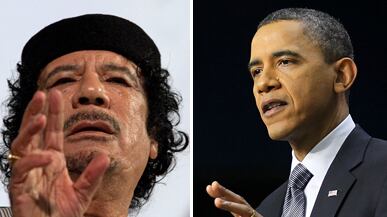Suppose Gaddafi falls tomorrow. Despite Tuesday’s fiery speech, he plainly is on the way out. When you are reduced to machine-gunning your people en masse, and your own diplomats turn against you, the handwriting is on the proverbial wall. Yes, there was a time not so long ago when vicious regimes could slaughter their people as they liked, and get away with it—one need only remember Tiananmen Square in 1989, or Prague in 1968—but that was before every cell phone could stream video around the world in seconds. A dictatorship that cannot control communications is bound to crumble.

The reason this is worth mulling is that when Gaddafi goes—and he will go, soon—we will have seen three of the longest-serving rulers in North Africa, each so seemingly unbudgeable that we assumed he would rule for ever, toppled by mass uprisings, all three within the span of two months.
The United States remains today the world’s great beacon of freedom and democracy. Yet we are still without a publicly articulated policy to link the cases together. The administration continues to behave as though each of these outbreaks of democratic fervor—along with others in Bahrain, Jordan, Yemen, and elsewhere—is somehow an independent crisis, to be managed through gentle suasion and public appeals on both sides to remain calm.
Thus, at his Feb. 15 press conference (following the fall of the Mubarak regime) the president had this to say:
“I think my administration’s approach is the approach that jibes with how most Americans think about this region, which is that each country is different, each country has its own traditions; America can’t dictate how they run their societies, but there are certain universal principles that we adhere to. One of them is we don’t believe in violence as a way of—and coercion—as a way of maintaining control. And so we think it’s very important that in all the protests that we’re seeing in—throughout the region that governments respond to peaceful protesters peacefully.”
It is past time for the United States to get ahead of the curve of democratic change, rather than constantly chasing it.
Alas, this understandably cautious response is really a rehash of decades of American policy in the region. The countries should not mistreat their people, but they have their own traditions, and so we should not impose our values on them. This sounds like the language of multiculturalist relativism, but it is actually the language of the sort of realpolitik that has allowed us, for generations now, to coddle dictators, in North Africa and the Middle East, and around the world.
Yet dictatorship is an inherently unstable form of government. This is no great secret. They all fall eventually, and, if recent weeks are any guide, they are likely to be falling in ever greater numbers in the near future. I wrote in this space before, but I will say again, that it is past time for the United States to get ahead of the curve of democratic change, rather than constantly chasing it.
• Leslie H. Gelb: Should America Cheer or Cringe?• Shocking photos and video from Libya• Full coverage of the Mideast uprisingsWhat do I mean by chasing it? Earlier this month, in his televised speech on Egypt from the Grand Foyer of the White House, the president said: “We stand ready to provide whatever assistance is necessary—and asked for—to pursue a credible transition to a democracy.” Here again, President Obama seems to be insisting that it is not our task to encourage others away from dictatorship and toward democracy. Our task, it seems, is to wait and see: If they ask, we will answer, but otherwise we will have little to say.
The trouble is, when you are in the street protesting in the face of massed riot police or even (in Libya) helicopter gunships, or if you are even considering the idea, you might want to know exactly where the administration stands. True, the United States might be willing to assist the transition once the dictatorship falls; but, you might reasonably ask, what is America’s attitude toward the dictatorship while it is in power? (The crowds in Bahrain, to name one, evidently did ask, through press reports, whether the United States was for them or against them; several dead protesters later, they are still waiting for an answer.)
The late Thurgood Marshall loved to tell the story of the man who was chasing after a protest march, trying to work his way to the front so that he could find out where they were headed and then announce that he was leading them there. That is not the role the world’s greatest democracy should be playing.
The moment cries out for leadership, for an Obama Doctrine that would give some assurance to those who dream of freedom that America is with them. Just to take the president’s own words, the Obama Doctrine might hold that the right to participate in government is fundamental, and that the yearning for freedom is universal, and that we will stand with those who sincerely demand democracy. Taken seriously, such a doctrine would serve as the basis for a policy of nudging entrenched regimes toward democratic reform—and sometimes nudging them hard. And it would serve notice on dictators and democrats alike both that we know the world will never be the same, and that we intend to take a hand in shaping what is to come out of the present chaos.
True, the Obama administration is in some ways a prisoner of history, and of our national interest. We have allies in the region; we have military bases; we have oil and shipping lanes to protect. But if our allies are going to fall, there is little we can do nowadays to prevent it. Historically, America has often been behind the curve of change; and we have paid a heavy price for lagging.
It is striking how similar President Obama’s situation is to the one that confronted his predecessor. Like George W. Bush, Barack Obama came into office intending to focus on domestic policy. Bush, although the history may now be difficult to call to mind, actually planned to limit the nation’s overseas commitments and implement his agenda at home. Alas, the events of Sept. 11, 2001, forced Bush’s attention abroad. In the end, the response to the terrorist attacks on America are what came to define the Bush presidency. One may think his decisions great or terrible or somewhere in between; but those decisions are what he will be remembered for.
President Obama faces a similar challenge. He had hoped to wind down America’s overseas wars and implement his agenda at home. Alas, the tide of democratic uprising across North Africa and the Middle East is forcing his attention abroad. The old slogans of realpolitik will not be sufficient. He needs to develop, swiftly, a clear doctrine to guide his administration and signal to the world whether America stands for or against the demonstrators who are likely, for some time to come, to pour into the streets of repressive regimes abroad. Because, no matter what President Obama might accomplish at home, his presidency will likely be judged by his role in responding to the rising tide of democracy.
Stephen L. Carter is the William Nelson Cromwell Professor of Law at Yale, where he has taught since 1982. His seven nonfiction books include God’s Name in Vain: The Wrongs. His first novel, The Emperor of Ocean Park (2002), spent 11 weeks on the New York Times bestseller list. His twelfth book, The Violence of Peace: America’s Wars in the Age of Obama, was published by Beast Books in January.






